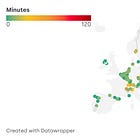Polish Border Controls: Extended Uncertainty Threatens to Constrain Freight Capacity and Drive Up Rates
Market Monday - Week 29 - Significant impact of stationary border controls in Poland monitored
Poland's reinstatement of stationary border controls starting July 7th, 2025 onwards, creates significant challenges for European logistics operations. These controls directly impact supply chain timelines and increase operational costs. With commercial freight now facing unpredictable delays at borders, companies need to reassess their cross-border strategies and address potential financial risks. This analysis provides the essential data on current wait times to help your business navigate this challenge and protect your bottom line.
Our data immediately confirms the significant impact of the reinstated controls. The chart above highlights the exceptionally high border delays monitored after implementing this measure. The baseline (Index 100) represents the 2024 average of wait times. While daily values also varied in the past and occasionally showed high levels, we haven’t experienced in the last year the peaks reached last week nor several days in a row with comparably elevated values.
To fully assess the situation, we need to understand the baseline conditions. In the past, thanks to fluid Schengen-area transit, wait times were minimal, typically, if at all only 10 to 20 minutes on specific peak days and times. Friday, July 11th was exceptional, the data showing border crossing delays of 90 minutes in extreme cases. The duration was also remarkable: from 01:00 PM to 11:00 PM the E30 at Słubice crossing from Güldendorf consistently showed 60 minutes of additional delay, while the E40 in Zgorzelec revealed 30 minutes delays.
Thursdays and Fridays have consistently been identified as days with the highest impact and efficiency loss for fleet owners. No surprise as these days with their peaks in eastbound truck crossings also reflect the typical cycle for truck movements: Mondays/Tuesdays westbound into Germany and Thursdays/Fridays back to Poland.
Current information on delays at European borders can be accessed through this link:
While it's premature to recommend specific actions or strategies to mitigate this efficiency loss given their temporary nature, we should understand the timeline. The initial announcement to the European Commission regarding these border checks specified a 30-day period from July 7, 2025, to August 5, 2025.
However, Polish officials, including the Prime Minister, have stated that while they do not intend to prolong the checks unnecessarily, their continuation is directly linked to Germany´s border controls. They have indicated the Polish checks will remain in place as long as Germany's measures are active, describing it as a "symmetrical" response. Therefore, despite the initial announcement, there is a strong possibility of an extension.
If these checks are prolonged, I foresee several potential consequences: service provisions from Eastern European fleet owners to Western Europe could decrease, spot rates could rise (particularly Thursday and Friday transports), and there could be opportunities to renegotiate contracted rates for affected routes.
Christian Dolderer
Lead Research Analyst
Trimble Transportation (Transporeon)



